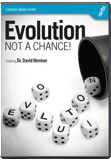
Crows May Outsmart Chimpanzees and Dolphins
If there were an animal version of the popular trivia program Jeopardy!, it might pit a chimpanzee against a dolphin against a crow. The surprising thing is, the crow might win!
News Source
- The Telegraph: “Crows May Be Smarter than Apes”
Since the inception of News to Note, one of the recurring themes we love to present is the intelligence of many animal kinds—not just apes. It seems ape intelligence is repeatedly implied to be evidence for our shared ancestry, when in fact God created many clever animals.
Even the crow, small though it may be compared to other animals, displays remarkable intelligence. We’ve covered news of crow intelligence previously, in many News to Note segments (see links below). Now, a team from Auckland University (New Zealand) has published even more evidence that crows are quite intelligent—showing, as The Telegraph puts it, that they can “reason causally and use analogy in a way not seen even in our closest relatives, the great apes.”
Auckland University’s Russell Gray and Alex Taylor, along with colleagues, formulated a series of tests to help figure out how crows think. The tests all involved a device referred to as a “trap tube”: a horizontal tube separating the crows from food; if the crow tries to remove the food in the wrong way, the food becomes trapped away, inaccessible to the hungry crow.
There are clues, however, on the device, such as the location of the hole and the color of the rim, to help show the crows the right way to remove the food. But would the crows really “understand” how the task works? Do they use reason to help them understand?
To answer the questions, Gray, et al., tested six New Caledonian crows with variations on the trap tube device. New Caledonian crows are known to make tools out of leaves, even “customizing” them into perfect implements to dig out food.
In the first set of tests, the crows were faced with a standard trap tube device with three “arbitrary features” inside to help the crows understand the trap. But then the testers switched things up: the features clueing the crows in were removed—yet three of the six crows were still able to solve the problem and extract the food without the hints.
Next, the scientists introduced a trap tube device with two holes, one trapped and the other open. The smartest crows were unable to repeatedly outsmart the trap, showing reluctance to move the food into either hole. However, this showed the crows did recognize that the holes could be associated with the trap.
Then the researchers threw the birds for a loop (figuratively): they presented the birds with a table version of the trap tube problem, whereby the crows had to decide whether to pull food across the table or into a hole in the table. The hints of the problem correspond with the trap tube device hints. The Telegraph explains the result:
Strikingly the crows in the University of Auckland study were able to solve the trap-table problem after their experience with the trap-tube. By solving the trap-table the crows demonstrated that they had not just learnt to pull away from the specific hole in the Perspex trap-tube, but could generalise what they understood to a novel problem.
“The crows appeared to solve these complex problems by identifying causal regularities."
Gray explained, “The crows appeared to solve these complex problems by identifying causal regularities. The crows’ success with the trap-table suggests that the crows were transferring their causal understanding to this novel problem by analogical reasoning. However, the crows still had trouble differentiating holes with bottoms from holes without.”
Compare the crows’ success to what apes accomplished: in a recent study, great apes were tested to see if they could transfer knowledge from the trap tube device to the trap table (and vice versa). All twenty failed to figure out the similarities.
Taylor explained, “It was very surprising to see the crows solve the trap-table. The trap table was visually different from the trap-tube in its color, shape, and material. Transfer between these two distinct problems, the trap-tube and trap-table is not predicted by theories of associative learning and is something not even the great apes have so far been able to do.”
As reported in a New Scientist write-up on the research, Taylor added, “This is the most conclusive evidence to date for causal reasoning in an animal.” The conclusion of The Telegraph was that “[T]he birds are able to outsmart people’s closest relatives”—but of course we beg to differ. While apes exhibit clear signs of intelligence, God created many other animal kinds that impress and surprise us with their craftiness. Ape intelligence is not evidence for evolution.
Further Reading
- Tools of Evolution
- Birds Able to Cooperate and Solve Problems
- Crows and Their Tools
- Bird-Brained Toolmakers
- Gorillas and Tools?
For More Information: Get Answers
Remember, if you see a news story that might merit some attention, let us know about it! (Note: if the story originates from the Associated Press, FOX News, MSNBC, the New York Times, or another major national media outlet, we will most likely have already heard about it.) And thanks to all of our readers who have submitted great news tips to us. If you didn’t catch all the latest News to Know, why not take a look to see what you’ve missed?
(Please note that links will take you directly to the source. Answers in Genesis is not responsible for content on the websites to which we refer. For more information, please see our Privacy Policy.)
Recommended Resources

Answers in Genesis is an apologetics ministry, dedicated to helping Christians defend their faith and proclaim the good news of Jesus Christ.
- Customer Service 800.778.3390
- © 2024 Answers in Genesis




